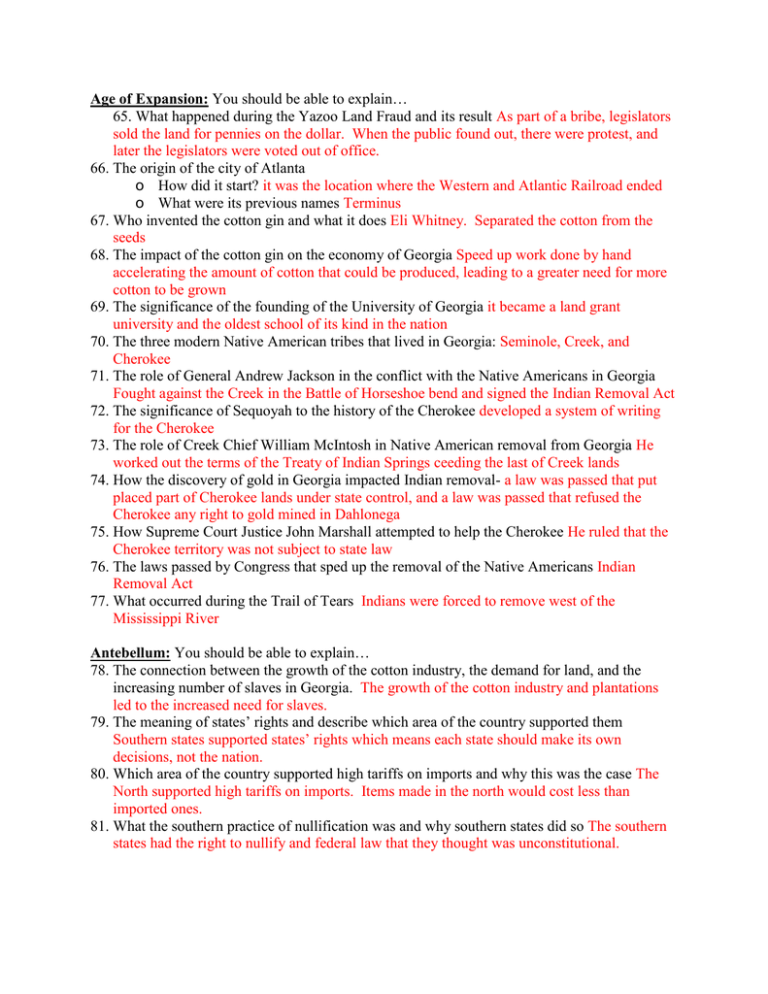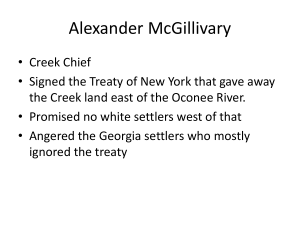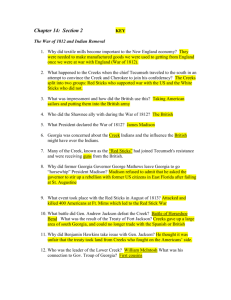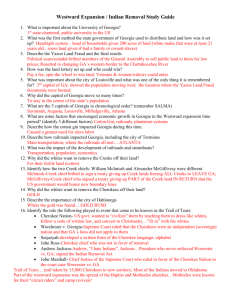Study Guide Key 65 thru 86
advertisement

Age of Expansion: You should be able to explain… 65. What happened during the Yazoo Land Fraud and its result As part of a bribe, legislators sold the land for pennies on the dollar. When the public found out, there were protest, and later the legislators were voted out of office. 66. The origin of the city of Atlanta o How did it start? it was the location where the Western and Atlantic Railroad ended o What were its previous names Terminus 67. Who invented the cotton gin and what it does Eli Whitney. Separated the cotton from the seeds 68. The impact of the cotton gin on the economy of Georgia Speed up work done by hand accelerating the amount of cotton that could be produced, leading to a greater need for more cotton to be grown 69. The significance of the founding of the University of Georgia it became a land grant university and the oldest school of its kind in the nation 70. The three modern Native American tribes that lived in Georgia: Seminole, Creek, and Cherokee 71. The role of General Andrew Jackson in the conflict with the Native Americans in Georgia Fought against the Creek in the Battle of Horseshoe bend and signed the Indian Removal Act 72. The significance of Sequoyah to the history of the Cherokee developed a system of writing for the Cherokee 73. The role of Creek Chief William McIntosh in Native American removal from Georgia He worked out the terms of the Treaty of Indian Springs ceeding the last of Creek lands 74. How the discovery of gold in Georgia impacted Indian removal- a law was passed that put placed part of Cherokee lands under state control, and a law was passed that refused the Cherokee any right to gold mined in Dahlonega 75. How Supreme Court Justice John Marshall attempted to help the Cherokee He ruled that the Cherokee territory was not subject to state law 76. The laws passed by Congress that sped up the removal of the Native Americans Indian Removal Act 77. What occurred during the Trail of Tears Indians were forced to remove west of the Mississippi River Antebellum: You should be able to explain… 78. The connection between the growth of the cotton industry, the demand for land, and the increasing number of slaves in Georgia. The growth of the cotton industry and plantations led to the increased need for slaves. 79. The meaning of states’ rights and describe which area of the country supported them Southern states supported states’ rights which means each state should make its own decisions, not the nation. 80. Which area of the country supported high tariffs on imports and why this was the case The North supported high tariffs on imports. Items made in the north would cost less than imported ones. 81. What the southern practice of nullification was and why southern states did so The southern states had the right to nullify and federal law that they thought was unconstitutional. 82. The causes and results of the Missouri Compromise Missouri Compromise allowed Missouri to enter the country as a slave state, and Maine as a free state, and the 36*30’N became the dividing line between free states and slave states. 83. The causes and results of the Compromise of 1850 In the compromise California became a free state, which was good for the north and the Fugitive Slave Law was passed, which helped slave owners. 84. Who the most outspoken and active abolitionists in the United States were Sojourner Truth, Harriett Beecher Stowe, William Lloyd Garrison 85. What occurred during the election of 1860 and why it further separated the nation Abraham Lincoln became the first Republican president. He won the election with votes from only part of the country. The election of 1860 led to the secession of southern states. 86. The events surrounding Georgia’s secession convention o Why was it held? To decide if Georgia should secede o Who attended? Mostly planters o What were its results? They voted to secede from the Union and formed a new nation called the Confederate States of America








